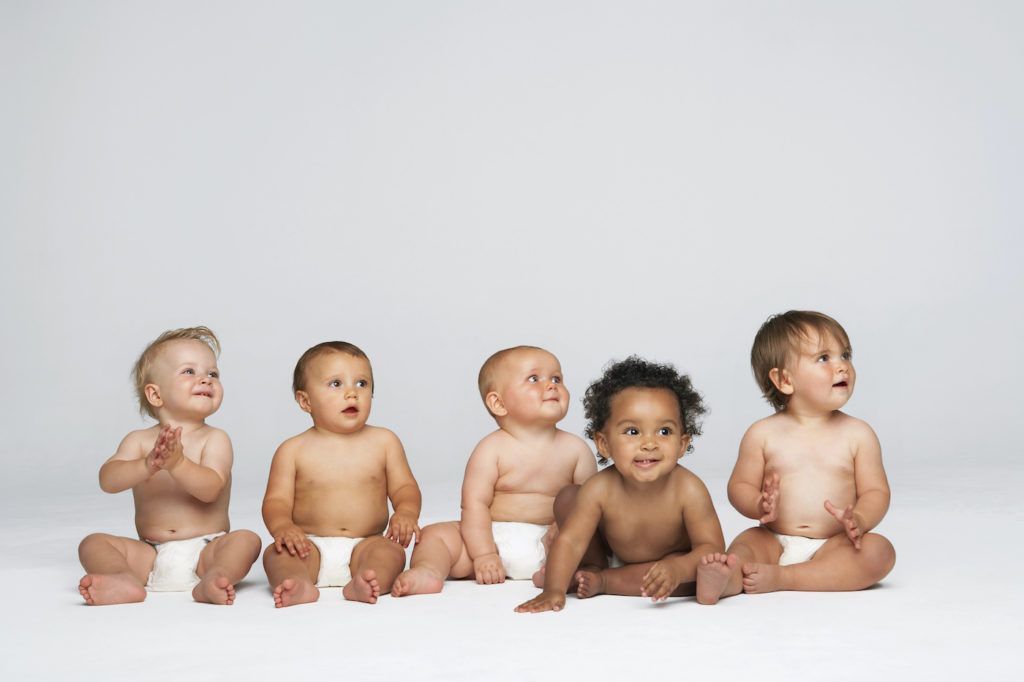A few months ago, my wife (who is now thirty-four weeks pregnant), our one-year-old son, and I moved into an apartment in downtown Des Moines. Our new home has treated us well so far. We have enjoyed taking walks around the block, visiting the local farmer’s market, and even waving to the “choo choo trains” that travel along the nearby railroad tracks. Our son, for his part, has also enjoyed looking at the dogs that live in our apartment complex.
And there is no shortage of dogs for him to see.
At most hours of the day, you can look out any of our windows and see one or more canines leading their owners for a stroll. If you walk down the hallway, you’re likely to hear one of the dogs greeting you from the other side of the door. Our apartment complex even boasts a community “pet spa” that residents are invited to use free of charge to groom their pets. After the first few weeks here, my wife and I couldn’t help but wonder if we were the only residents in our building who didn’t own a dog.
The possibility that we are the lone dogless residents is especially curious when juxtaposed against another observation we’ve made: we might be the only residents with children. Now, our observations are admittedly not very scientific. I’m sure we’re not the only dogless residents, and it’s quite possible that there are other children in our building; we just haven’t seen them if they’re around. But whether our observations accurately capture the makeup of our neighbors or not, one thing is undeniable. We’re aware that we’re different. Just about everyone else, it seemed, was young, unmarried, and a dog owner.
Start your day with Public Discourse
Sign up and get our daily essays sent straight to your inbox.Pope Francis has noticed a growing preference for dogs over children as well. He recently discussed the “demographic winter” in which “people do not want to have children, or just one and no more,” where “dogs and cats take the place of children.” The pope’s address won him more than a few scathing opinion pieces in popular outlets for suggesting that choosing pets over parenthood involves “a certain selfishness.” The “denial of fatherhood or motherhood diminishes us,” said Pope Francis. It “takes away our humanity.”
His comments came in the context of a reflection about Saint Joseph’s role as the foster father of Jesus, delivered during his weekly Wednesday audience on January 5, 2022. Pope Francis looked to the example of Saint Joseph in calling the choice to welcome new life “among the highest forms of love.” The pope also encouraged couples who are unable to have children “not [to] be afraid to choose the path of adoption, to take the ‘risk’ of welcoming children,” especially in light of the many children today who are orphans. Risk is inherent in having children, either naturally or by adoption, the pope tells us. “But it is riskier not to have them,” lest we “deny fatherhood, or . . . motherhood, be it real or spiritual.”
In the face of the uproar with which Pope Francis’s message was received, I’d like to offer a brief defense of his address and some words of encouragement to my fellow twenty-somethings who are discerning marriage and parenthood, unpopular though they may be. In my almost two years as a dad, I’ve learned three lessons that, although seemingly counterintuitive, reinforce the pope’s call to experience the “richness of fatherhood and motherhood.” Of course, the call to parenthood looks different for those who try to conceive but are unable, and nothing I say should be taken as a dismissal of the difficult situation in which such couples find themselves.
Parenthood Is Not Easy
First, parenthood is not easy. I assume that most people, and especially those who choose to avoid having children, already know this. Being a parent requires a certain amount of financial and even social austerity. While a dog must be trained and fed and groomed, a child requires so much more. Fatherhood and motherhood entail a call to be not only a child’s first caregiver, a daunting task in itself, but also his or her first educator and primary source of moral and spiritual support. The question, then, is why a couple would ever willingly choose to commit themselves to a lifelong task—this thing called parenthood—that everyone knows to be difficult. Yet to ask the question is to answer it.
Great religious and nonreligious thinkers have agreed that nothing in this world worth pursuing is easy. We see this theme repeated across space and time. Odysseus’s epic homecoming is still read today not because his journey was easy but precisely because it was not. Nietzsche quipped that “what does not kill me makes me stronger.” A favorite motivational line of modern coaches and fitness trainers is “no pain, no gain.” And it was Saint Zélie Martin, a model of motherhood, who captured perfectly the spiritual variation on this theme: “I want to be a saint; it will not be easy at all.”
Pope Francis reminds us that to be a parent is to love. If we can increase our health and fitness and intelligence and career success only by subjecting ourselves to what is not easy, why would our capacity to love be any different? Self-giving and self-sacrifice are baked into what it means to be a parent, and as any parent will tell you, this constant gift of time and energy and resources is not always easy. But it is precisely this—growing in love for your child every day, even and especially through difficult times—that also makes parenthood worth it.
The question, then, is why a couple would ever willingly choose to commit themselves to a lifelong task—this thing called parenthood—that everyone knows to be difficult. Yet to ask the question is to answer it.
Parenthood Is Liberating
Second, parenthood is liberating. Understood solely as unabashed egoism, as overcoming all external restraints on individual expression, freedom would not seem to increase with parenthood. The obligations of fatherhood and motherhood require parents to say “no” to certain self-interested pursuits in ways that being a “dog parent” do not. You can’t leave your toddler at home unattended for hours to catch a movie or go bar hopping, and the cost of diapers, wipes, clothes, baby food, etc. certainly outweighs the cost of dog food and kitty litter, for example. But this Millian conception of liberty is cramped in that it fails to consider what freedom is for. True freedom is choosing to fulfill our moral obligations and to live a virtuous life, rather than allowing our basest instincts to dictate our behavior, guided by a philosophy of “anything goes” so long as others are not harmed.
Parenthood is liberating because few experiences rival the profundity of a parent’s choice to raise a child in accordance with right reason. Unlike pet owners, whose obligations to their pets don’t extend beyond ensuring that the animal’s most basic needs are met, parents have the freedom to inculcate virtue in their children, to bring them up as faithful followers of God and thoughtful members of society. Reflecting on the interplay between parenthood and freedom, Bishop Fulton J. Sheen said, “In each child God whispers a new secret to the world; adds a new dimension of immortality to creation; and makes the clinging hearts of husband and wife feel a little freer, as they look into that strange and mutual hope which has come to them from God.”
The freedom to parent, and especially to parent well, is undoubtedly a grave and even scary responsibility to undertake. Pope Francis knows this. He nonetheless encouraged those discerning parenthood. “Do not be afraid” of the desire to be a parent, he said. The natural “longing” to be a father or a mother is a good thing, the pope tells us, because “fatherhood and motherhood are the fullness of the life of a person.” A life lived to its fullest is a life that embodies what it means to be truly free. And parenthood offers couples a unique opportunity to embrace the kind of freedom that seeks the good—indeed, to share it with their children.
“Do not be afraid” of the desire to be a parent, Pope Francis said. The natural “longing” to be a father or a mother is a good thing, the pope tells us, because “fatherhood and motherhood are the fullness of the life of a person.”
Parenthood Is Unifying
Third, parenthood is unifying. But don’t take it from me, or even the pope. Well over two millennia ago it was Aristotle, in his Nicomachean Ethics, who observed that children “seem to be a bond of union, and therefore childless marriages are more easily dissolved.” And modern sociological studies and statistics confirm the empirical truth of that ancient intuition. Far more interesting than the fact that couples who have children have more successful marriages, as a group, than those who don’t, however, is thinking about the reasons why. Aristotle, again, may lead us to an answer.
In Aristotle’s schema, there are three kinds of friendship: that based on utility, that based on pleasure, and that based on virtue. In the first two kinds of friendship, each person joins the friendship because he enjoys the benefits he derives from the other friend. The third kind of friendship—the highest and rarest form—is different. Friendship rooted in virtue means willing the good of the other for the sake of the other, not because of any personal benefit that the friendship brings. Such friendships are possible only when each friend is virtuous and independently strives toward goodness itself. It is this shared commitment to goodness that unites two people in this most “perfect form of friendship.” In other words, friends whose relationship is rooted in virtue love each other because they are pursuing a common goal: goodness itself.
It is not hard to see how parents fit into this scheme. When a man and a woman choose to become parents, they undertake a joint lifelong commitment to something outside themselves, something that is good—in its best form, to raising virtuous children. As Professor Angela McKay Knobel previously put it at Public Discourse, for parents who are true friends, “rearing children means more than securing the basic necessities of life or getting good things for oneself; it means pursuing virtue together, in and through the shared activity that marriage is about. It means ordering the most basic activities of life to the pursuit of goodness.” Parenthood is unifying because each parent loves his or her children, as Aristotle says, “as soon as they are born.” And in loving their children (and ultimately, God) the two spouses grow ever nearer to each other, allowing them to experience more fully that most perfect form of friendship.
No one, and certainly not Pope Francis, is saying that we ought not care for or about animals. The Catechism of the Catholic Church makes clear that we must show kindness to animals because God entrusted them to our stewardship. Rather, the point is that we are all called to fatherhood or motherhood (adoptive, biological, or spiritual), and suppressing that call diminishes what it means to be fully human. Parenthood is a weighty and difficult and awesome responsibility. Yet I have no doubt that if more people answered the call to become parents, we would see some of the tumultuousness of “this world” diminish, even if only by a little bit.














